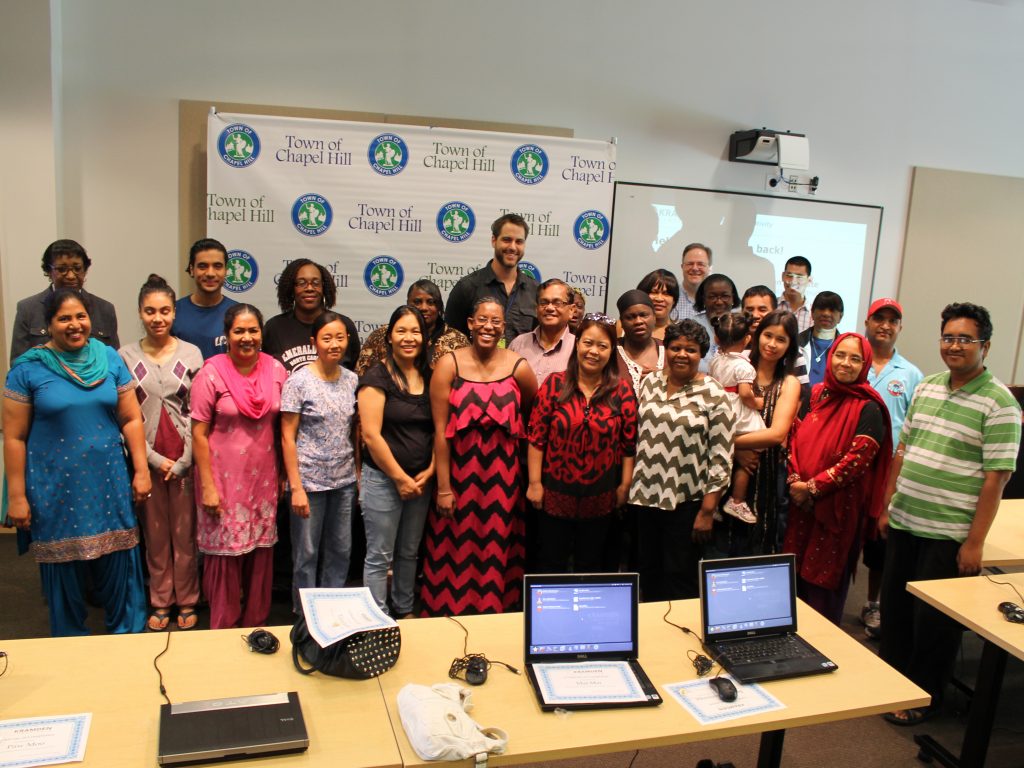
It wasn’t a grand setting for a groundbreaking announcement – the basketball court of the South Estes public housing community in Chapel Hill. Eager volunteers stood at folding tables under the hoops ready to sign up residents for digital literacy classes and announce the Town’s new effort to bring free internet to all public housing residents. Trays of sausage and chicken biscuits, and jugs of sweet tea sat ready for an estimated 100 people.
“We were hoping to sign up perhaps a dozen residents for the computer classes,” said Sarah Vinas, assistant director of the Town of Chapel Hill’s Office of Housing and Community. “Instead, we signed up over 50 people that morning, and another 10 were put on waiting lists.”
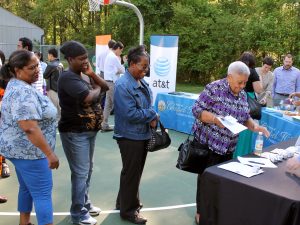
The community partners who gathered that morning in May 2015 were pleasantly surprised. A school bus driver arrived with little time to spare, as she was between driving shifts. An older man approached with careful steps, using a cane to make his way over a grass field toward the basketball court. Three women in colorful saris and sandals approached with tentative expressions. A young mother with children in tow took her place in line.
They were signing up for a program that seeks to address two major impediments to digital inclusion: lack of access to a computer and lack of technology skills. Through a four-part course series, participants learn basic computer skills — and upon completion of the course are awarded a laptop computer.
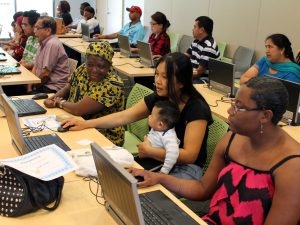
Amplifying our Impact through Partnerships
The computer classes are part of a multi-pronged effort to provide free internet, laptops, and digital literacy classes through the Town of Chapel Hill’s partnerships with Kramden Institute. The Town’s partnerships with AT&T and Google Fiber has led to free internet service at all its 13 public housing communities.
Since announced in May 2015, six cohorts have completed the program (100 residents by November 2016). Key outcomes, as reported by participants include:
- 76% increased their confidence in using a computer.
- 82% increased their knowledge of how to use programs available on home computers.
- 70% increased their understanding of what the internet is and the ways it can be used.
In 2016, the Basic Digital Literacy curriculum was expanded to offer a Job Seeking in the Digital Age Course, made possible through a $10,000 grant from Google Fiber.
A news release states the Town’s overarching goals: “By establishing public-private partnerships like these, the Town of Chapel Hill strives to enable all members of the community to take part in the new forms of civic engagement, expanded opportunities for education, and economic growth associated with bringing faster internet speeds to the region.”
Listening Brings Lessons and Learning
Through in-person meetings and tabular surveys, we discovered things about our Chapel Hill public housing residents that we didn’t know before. There are about 1,000 residents who live in a total of 336 public housing units. Town staff looked at demographics of residents, which have shifted over the last several years with increasing racial and ethnic diversity. Currently, there are 30 countries represented in the Town’s public housing.
- Almost half are 21 years old or younger
- Over half the sampled population identifies as Black
- One-third of the sampled population identifies as Asian
- Less than 10% identified as White
- About one-third of residents reported being born outside the United States
- The majority of people from outside countries (150) are from Myanmar (Burma)
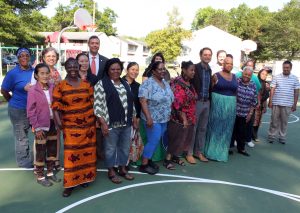 A Residents Leadership Team has formed to drive programs and services going forward, with representation of at least one resident from each of the 13 neighborhoods. Town staff members on a Residents Services Team are responding to priorities expressed – English as a Second Language classes, neighborhood cleanups, and after-school programs for youth.
A Residents Leadership Team has formed to drive programs and services going forward, with representation of at least one resident from each of the 13 neighborhoods. Town staff members on a Residents Services Team are responding to priorities expressed – English as a Second Language classes, neighborhood cleanups, and after-school programs for youth.
“We’re starting to see more residents engage in programming,” said Executive Director of the Office of Housing and Community Loryn Clark. “Our hope is that we will start planning activities with what residents say they want. We shouldn’t be guessing.”
Collaborating and Igniting Ideas
Internal municipal government departments have been integral to our efforts moving forward. Police and Fire support special events and neighborhood safety initiatives; the Library hosts our classes and workshops; Technology Solutions assists with our internet access efforts; Public Works and Parks and Recreation participate with resident-led neighborhood cleanups and special events, and numerous others support resident services activities.
We work with several public schools in the community to mentor at-risk kids and provide wrap-around support services to promote academic success. We partner with community agencies that receive human services funding from the Town to provide programs for residents, such as ESOL, cooking, gardening, smoking cessation, and after school care for children. Many are excited to be involved.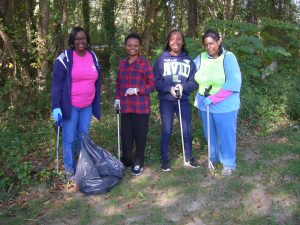
Telling Our Story
Community engagement at its best bears fruit in a ripple effect of partnerships and increased understanding of purpose. This is what we’ve seen in Chapel Hill, NC, after we refreshed our efforts two years ago to engage with residents of our public housing neighborhoods. Although we still have much work to do, we are seeing that each touch-point of moderate success seems to bring more community collaboration and involvement. It has taken a momentum all its own.
To learn more about our programs, visit our website at http://www.townofchapelhill.org/town-hall/departments-services/housing-and-community.
For Catherine and Loryn Clark – would like to hear more – particularly from participants in the programs you report on about this goal: “…all members of the community to take part in the new forms of civic engagement.”
I ask because, per many communities’ experience, it is usually harder for low income and those born outside the U.S. to be involved, and get to leadership roles, in civic organizations
What are the results, or maybe a story or two, about not just their computer and internet skills – which are important – but the part of the goal: to take part in the new forms of civic engagement?
I like your point about moderate success and ripple effects. I guess I’m hoping for a clearer ripple effect in terms of engagement.
For example, are the >>new forms<< only online [e.g. discussion forums]? Or are you thinking about citizen academies and policy-oriented involvement, beyond what you site as volunteer service – such as neighborhood cleanups.
Finally, have you taken lessons from other communities’ and their work to better support and involve the residents of public housing? Thanks, John
• We have launched a Resident Leadership Team, a representative group of residents who provide guidance on resident programming and services and opportunities for improving the Town’s public housing neighborhoods. The resident leaders serve as liaisons to their neighbors to share information and encourage community engagement. This is a newly formed group, and we are working toward having one representative per neighborhood.
• Self-organizing efforts. There are many examples of residents within our public housing neighborhoods self-organizing to address issues that they have identified. For example, a parent support group formed, which meets on a weekly basis to discuss parenting challenges, share ideas and suggestions, and provide support to one another. Several residents serve as the point person for food distribution within their neighborhoods. Meaningful involvement takes time. Central to our effort is building trust. When we follow up on the concerns that residents say are most important to them, we demonstrate that we are listening and responding to their top concerns.
• Learning from others. Many thanks to Beth McKee-Huger for sharing experiences in the Cottage Grove neighborhood in Greensboro, NC. We continue to look for opportunities to connect and learn from others like Beth and our entire CELE community.
As community residents build confidence and communication skills—through English and internet—they can speak up for what they want or don’t want in their neighborhoods. As the public institutions and nonprofit organizations that impact their lives, we need to be ready to listen and to change our practices when they result in barriers. Sometimes we get frustrated that few people participate in our efforts to “help” because we haven’t paid enough attention to what people want. It sounds like Chapel Hill has succeeding in finding some of the ways community residents want to get involved. In the Cottage Grove neighborhood in Greensboro, we are finding that door to door outreach by residents is connecting neighbor and building trust so that they can speak up for how they want to make changes in the community.
Beth, Thank you — and, your post about the new vision for the Cottage Grove neighborhood is definitely worth revisiting — http://cele.sog.unc.edu/cottage-grove-for-life-greensboro-neighborhood-redevelopment/
When residents were asked about their priorities for this Greensboro neighborhood, they said “a health clinic, jobs, better housing, vegetable gardens, bus shelters, safe parks, and English for Speakers of Other Languages.” And, today they are working to reach this vision — because these are the purposeful changes they want. The first step to engagement is listening, and it sounds like the approach driven by resident leaders offered open questions that generated valuable input from their neighbors. When the vision was shared from the entire community, residents found it meaningful, and now they are motivated to achieve it.